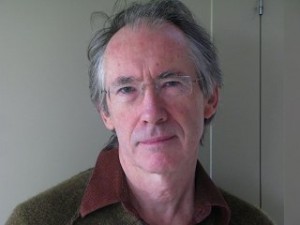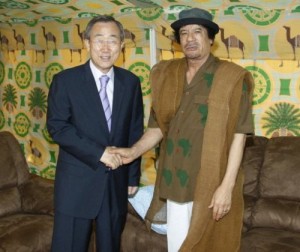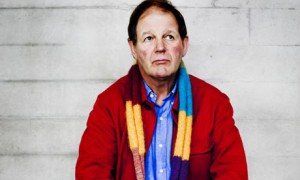 This week, British author Ian McEwan accepted the Jerusalem Prize for Literature at a ceremony in that city.
This week, British author Ian McEwan accepted the Jerusalem Prize for Literature at a ceremony in that city.
McEwan took the opportunity to both praise and also criticise Israel.
He had been put under intense pressure by anti-Israel and pro-Palestinian groups to turn down the prize.
Adam Levick of CiF Watch (the website dedicated mainly to alerting us about the egregious Israel bashing in the Guardian’s Comment Is Free web forum) was critical of McEwan. In an article headed “The moral confusion of Ian McEwan” Levick berates McEwan for not condemning those groups who agitated for his rejection of the prize and also for what Levick sees as McEwan’s moral equivalence in his views of Israel and Hamas:
If we lived in a just world, where people didn’t stand idly by in the face of the continuing assault on Israel’s moral legitimacy, author Ian McEwan would have reacted with outrage at demands by Palestinian groups that he participate in a boycott of Israel by refusing to accept the Jerusalem Prize for Literature.
In such a world, McEwan would have passionately denounced the letter to the Guardian from a group called British Writers in Support of Palestine, which urged him to decline the award which they characterized as “a cruel joke and a propaganda tool for the Israeli state” and which went on to denounce the Jerusalem Municipality as complicit in the “illegal colonisation of East Jerusalem.”
McEwan, in such a scenario, would have responded by noting that Israel, whatever its imperfections, remains a small bastion of freedom in a region plagued by despots and tyranny, and is in fact the last nation in the Middle East deserving of such opprobrium and sanctions.
In short, he would [have] turned the charge around and expressed to his Palestinian interlocutors how appalled he was at the mere suggestion that Israel, the nation where freedom of political and artistic expression is most arduously protected, should be isolated by the artistic community.
I think Adam Levick expects too much of McEwan given his liberal credentials. I also believe that he underplays the good things McEwan said about Israel. He fails to mention how important it is that those who share McEwan’s views on settlements and Jerusalem do not take part in any boycott, and have the moral fibre to go to Israel. Once there they can demonstrate that, unlike in the despotisms and tyrannies of which Levick writes, they are free to criticise the state.
Is it not better that he should go and criticise rather than succumb to the bullying tactics of the Israel-haters? Compare to the craven Mike Leigh who I wrote about here and several artists who have cancelled concerts because of pro-Palestinian or left-wing pressure groups.
McEwan has also spoken out strongly against Islamic fundamentalism and antisemitic rhetoric. It should also be noted that he spent much of his youth in pre-Gaddafi Libya.
However, the issue of moral equivalence is valid.
Here are the salient points of McEwan’s acceptance speech which you can currently find on his website:
After showing humility at being the recipient of a prize previously given to such luminaries as “…Isaiah Berlin, Jorge Luis Borges, or Simone de Beauvoir”, McEwan recounted the pressure he had been put under NOT to come and accept the prize:
Since accepting the invitation to Jerusalem, my time has not been peaceful. Many groups and individuals, in different terms, with varying degrees of civility, have urged me not to accept this prize. One organisation wrote to a national newspaper saying that whatever I believed about literature, its nobility and reach, I couldn’t escape the politics of my decision. Reluctantly, sadly, I must concede that this is the case.
And the reason for this: “ I would say as a general principle that when politics enters every corner of existence, then something has gone profoundly wrong.”
But hold on. Why is the Israel-Palestine situation so uniquely part of everyone’s existence?
If he were in the United States accepting the Pullitzer Prize, would he drone on about freedom and Guantanamo Bay or extraordinary rendition?
If he were accepting the Booker Prize, again, would he berate the British government for its actions in Afghanistan or Iraq? Would he have mentioned the ‘troubles’ in Northern Ireland a few years ago? I don’t recall he ever did these things in accepting the Booker Prize.
Would he go on about Chechnya or Georgia if he were to receive a prize from Russia?
Would he berate the Turks for the Armenian genocide and the occupation of Cyprus?
Would he lay down the law to the Japanese about whaling or the Chinese about the lack of freedom in that country?
Would he protest Saudi treatment of women and their medieval legal system?
Why does everyone feel that they have the right to comment, whatever the occasion, however unrelated, about the policies of Israel? McEwan claims this right because he feels he is speaking at the heart of the most politicised conflict in the world.
This is a conflict about which almost everyone has an opinion but very few have the true facts or understand the history.
“… no one can pretend here that all is well when the freedom of the individual, that is to say, of all individuals, sits so awkwardly with the current situation in Jerusalem”
A first shot across the Israeli bows. He is in Jerusalem, the epicentre of the 100 year conflict. His justification for speaking out:
once you’ve instituted a prize for philosophers and creative writers, you have embraced freedom of thought and open discourse, and I take the continued existence of the Jerusalem Prize as a tribute to the precious tradition of a democracy of ideas in Israel
A plus point for Israel. At least he acknowledges Israel’s democracy and freedom and claims his right, therefore, to free speech in Israel.
Is it not a fact that many in Israel are far more critical than McEwan is about to become? But I ask myself ,’ does he have a right?’ He feels he is morally obliged to speak. He is a man of conviction and a strong moral sense; a belief in human freedom. How can he remain silent?
McEwan goes on to demonstrate his knowledge and appreciation of Israeli writers and their politics:
There are so many writers one could mention, but let me single out three senior figures who have earned the respect and love of readers around the world — Amoz Oz, Abrahim Yehoshua and David Grossman. Very different writers, with overlapping but far from identical politics, writers who love their country, have made sacrifices for it — and have been troubled by the directions it has taken, and whose work never fails with that magic dust of respect, the bestowing of the freedom of the individual on Arab as well as Jew. In their long careers they have opposed the settlements. They and Israel’s younger literary community are the country’s conscience, memory and above all hope. But I think I could say of these three writers that in recent years they have felt the times turning against their hopes.
I’m getting a very slight sense of a patronizing tone. It’s not intended, but it’s along the lines of little Israel and its wonderful Jewish heritage, its people’s embracing of centuries of philosophy and yearning for freedom, its suffering. So you should know better than to oppress Palestinians.
We now come to the part of the speech about which Adam Levick was so disappointed. This is where McEwan compares, and so equates, the actions of Israel with the actions of its enemies, and in doing so expresss that narrative of moral equivalence which slips so easily from the tongues of the liberal West.
Taking this line, he is not being ‘evenhanded’ or ‘fair’ or ‘balanced’, he is falling into the same trap that statesmen and writers and commentators often fall into. And they fall into it precisely because they do not want to take sides, and by not doing so, they commit the sin of moral equivalence.
This is not to say that Israel is never wrong or that it never acts immorally. No nation can say that. What is almost always omitted is the utter lack of of morality of those seeking Israel’s destruction under the cover of a land dispute.
Oh yes, McEwan acknowledges the ‘extinctionist policy’ of Hamas in his speech, but his theme of nihilism then leads to this:
I’d like to say something about nihilism. Hamas whose founding charter incorporates the toxic fakery of the Protocols of the Elders of Zion, has embraced the nihilism of the suicide bomber, of rockets fired blindly into towns, and embraced the nihilism of an extinctionist policy towards Israel. But (to take just one example) it was also nihilism that fired a rocket at the undefended Gazan home of the Palestinian doctor, Izzeldin Abuelaish, in 2008, killing his three daughters and his niece. It is nihilism to make a long term prison camp of the Gaza Strip. Nihilism has unleashed the tsunami of concrete across the occupied territories. When the distinguished judges of this prize commend me for my ‘love of people and concern for their right to self-realisation’, they seem to be demanding that I mention, and I must oblige, the continued evictions and demolitions, and relentless purchases of Palestinian homes in East Jerusalem, the process of right of return granted to Jews but not Arabs.
Wow. Let’s see what he is saying. He takes an example, an infamous one, of the tragic events around the killing of the Abuelaish family. Yes, it was tragic, yes, any decent person would be shocked and horrified, even ashamed that this could happen. The IDF gave a detailed explanation of the events leading to this tragedy. Whatever you may conclude about the IDF’s tactics in Gaza, this was not ‘nihilism’, this was a mistake, a bad one, a terrible one, but it was not a deliberate act.
Suicide bombs, rockets fired at civilians, using human shields, using children as cover for terrorism or military operations, using ambulances to carry weapons, teaching children to hate, preaching genocide, denying the historical ties and uninterrupted Jewish connection with the Land, Islamising Jewish holy places, are ALL deliberate nihilistic acts.
Of cause, building settlements is also a deliberate act, but it is an act that can be supported by international law and treaties despite what the world wants to believe. Whether it was ever wise or moral to build settlements is another question.
The ‘Gaza Prison Camp’ accusation is a familair one, not least to followers of David Cameron. Leaving aside the fact that ‘prison camp’ conjures images that are totally inaccurate of life in most of Gaza, in terms of the Gazan’s lacking the freedom to leave Gaza, it is largely accurate, apart from the thousands that do leave illegally through the tunnel into Egypt or via crossing points to receive hospital treatment in Israel.The fact that Egypt sealed its border with Gaza not to keep in ordinary Gazans, but to keep out Hamas, is almost always ignored.
The cold facts are that Hamas has launched an aggressive war against Israel with whom it remains in an official state of belligerence. Whereas Israel would much rather not fence in Gazans and blockade their ports and would prefer the peace they expected when they withdrew from Gaza, instead Hamas chose to attack Israel with a tsunami (to use McEwan’s word) of poorly directed missiles whose sole purpose was, and remains, to terrorise.
The aforementioned ‘tsunami of concrete’ is another bloated rhetorical trick; hyperbole in McEwan’s literary circles.
McEwan appears to be referring to the separation barrier. The barrier is concrete for only part of its length, although this is most obvious in Jerusalem itself.
Does McEwan think it ‘nihilism’ to prevent the nihilsitic suicide bombers, and other terrorists, free access to Israel as they did before the barrier was built? Terrorist attacks have been reduced to a trickle, lives have been saved on both sides. This is not nihilism, it is the desperation and exasperation of a country that has been, and continues to be, under attack from its neighbours for more than 60 years.
McEwan is also troubled by evictions, demolitions and property acquisition in what is termed ‘occupied’ East Jerusalem. Without wishing to mount a complex and detailed defence of Israel’s policy in Jerusalem, not all of which I agree with, I would point out that there is a lot of misinformation and propaganda when it comes to these issues. There is much discussion and controversy in Israel itself.
After her recent visit here, The UN High Commissioner for Human Rights notes that the firing of rockets into Israel from Gaza constitutes a war crime. She also notes that that the annexation of East Jerusalem contravenes international law and that East Jerusalem is steadily being drained of its Palestinian inhabitants.
One of the givens of the Middle East peace process is that Palestinians are eager to be free of rule by Israel and to live in a state of their own. That’s why a new poll of the Arabs of East Jerusalem is striking: It shows that more of those people actually would prefer to be citizens of Israel than of a Palestinian state.
The poll, conducted in November, may be something of an embarrassment to Palestinian political leaders, who lately have been insisting that Israel should stop expanding settlements in the eastern half of Jerusalem — in effect giving up any claim to it — as a precondition for the resumption of peace negotiations.
….
The awkward fact is that the 270,000 Arabs who live in East Jerusalem may not be very enthusiastic about joining Palestine. The survey, which was designed and supervised by former State Department Middle East researcher David Pollock, found that only 30 percent said they would prefer to be citizens of Palestine in a two-state solution, while 35 percent said they would choose Israeli citizenship. (The rest said they didn’t know or refused to answer.) Forty percent said they would consider moving to another neighborhood in order to become a citizen of Israel rather than Palestine, and 54 percent said that if their neighborhood were assigned to Israel, they would not move to Palestine.
The claim by the UN Commissioner that East Jerusalem is being drained of Arabs is utter nonsense. In fact, the opposite is true. Since 1967 when Israel took control of all of Jerusalem (from the Jordanians, please note) the Arab population has grown by more than 250 percent. Hardly the ethnic cleansing that the Commissioner appears to be coyly hinting at. Under Jordanian occupation for 19 years the Arab population did not increase at all.
McEwan also mentions “the process of right of return granted to Jews but not Arabs”. Here he is at his most naive. There is no right of return guaranteed for Arabs and certainly not 4th and 5th generation refugees. The author has really swallowed the Palestinian agitprop like so many well-meaning and even more less well-meaning detractors of Israel. Indeed, if we are to believe the recent PaliLeaks documents from Al Jazeera, the Palestinian Authority was ready to concede that Israel could not reasonably be allowed to absorb millions of Palestinians.
So, in conclusion, I’d rather defend McEwan than attack him. He came to collect his prize and then donated it to a charitable cause: “Ian McEwan is donating ten thousand dollars to ‘Combatants for Peace’, an organisation that brings together Israeli ex-soldiers and Palestinian ex-fighters. These ex-combatants go about in pairs, talking in public to make the case that there can be no military solution to the conflict.” his website tells us.
I clearly don’t agree with a lot of McEwan’s views on Israeli policy. I do understand why he might have these views because thousands of Israelis and Jews around the world share them. At least he feels free to express his views and even go to Sheik Jarrah to join in the left-wing protests against evictions where he was joined by fellow author and Israeli activist, David Grossman. I wonder how many demos McEwan has seen fit to take part in in the UK where he is not known as being politically active.
I applaud him for going to Israel. I believe he has a right to say what he believes. I do agree with Adam Levick that the moral equivalence that tries to force Israel’s re-actions into the same mould as its enemies’ actions is a form of moral imbalance induced by both a lack of knowledge and a predisposition to see the world, and this conflict in particular, as a story of two ‘rights’ which conflict rather than a story of decades long Palestinian and Arab rejectionism which still persists and is the main obstacle to peace.
Celebrated Italian writer Umberto Eco on Wednesday said boycotting scholars for their governments’ policies is “a form of racism” and “absolutely crazy.”But he said he faced no pressure from colleagues to boycott a book fair in Jerusalem to protest Israel’s treatment of the Palestinians.
…He told reporters Wednesday he enjoys Israeli novels and his books’ themes are influenced by Jewish culture.


